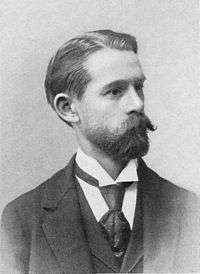Herbert Spencer Jennings
| Herbert Spencer Jennings | |
|---|---|
 | |
| Born |
April 8, 1868 Tonica, Illinois |
| Died |
April 14, 1947 Santa Monica, California |
| Fields | zoology |
Herbert Spencer Jennings (born in Tonica, Illinois, April 8, 1868; died in Santa Monica, California, April 14, 1947) was a zoologist, geneticist, and eugenicist. His research helped demonstrate the link between physical and chemical stimulation and automatic responses in lower orders of animals. Tracy Sonneborn would later write:
Jennings was so struck by the continued production of hereditarily diverse clones at conjugation, even after many successive inbreedings, that he undertook to examine the matter mathematically. As a result, general formulae for the results of diverse systems of mating were published in a series of papers between 1912 and 1917; these were one of the main seeds from which the whole field of mathematical genetics developed.[1]
In 1924, Jennings published an article in Scientific Monthly on "Heredity and Environment" which was prescient for anticipating the double helix, and provocatively liberal for its comments on racial differences and American immigration policy.[2]
Jennings was the recipient of the inaugural 1925 Leidy Award of the Academy of Natural Sciences of Philadelphia.[3]
References
- Marler, Peter (2005), "Ethology and the origins of behavioral endocrinology.", Hormones and Behavior (Apr 2005) 47 (4), pp. 493–502, doi:10.1016/j.yhbeh.2005.01.002, PMID 15777816
- Schloegel, Judy Johns; Schmidgen, Henning (2002), "General physiology, experimental psychology, and evolutionism. Unicellular organisms as objects of psychophysiological research, 1877-1918.", Isis; an international review devoted to the history of science and its cultural influences (Dec 2002) 93 (4), pp. 614–45, doi:10.1086/375954, PMID 12664793
- Barkan, E (1991), "Reevaluating progressive eugenics: Herbert Spencer Jennings and the 1924 immigration legislation.", Journal of the history of biology 24 (1), pp. 91–112, doi:10.1007/BF00130475, PMID 11612743
External links
- T.M. Sonneborne article on the life of Herbert Spencer Jennings
- H. S. (Herbert Spencer) Jennings papers American Philosophical Society
- National Academy of Sciences Biographical Memoir
Notes
- ↑ Sonneborn, T M (1974), "Herbert Spencer Jennings.", Biographical memoirs. National Academy of Sciences (U.S.) 47, pp. 143–223, PMID 11615625
- ↑ Herbert Spencer Jennings, "Heredity and Environment," The Scientific Monthly, Vol. 19, No. 3 (Sept., 1924), pp. 225-238
- ↑ "The Four Awards Bestowed by The Academy of Natural Sciences and Their Recipients". Proceedings of the Academy of Natural Sciences of Philadelphia (The Academy of Natural Sciences of Philadelphia) 156 (1): 403–404. June 2007. doi:10.1635/0097-3157(2007)156[403:TFABBT]2.0.CO;2.
|
This article is issued from Wikipedia - version of the Friday, February 12, 2016. The text is available under the Creative Commons Attribution/Share Alike but additional terms may apply for the media files.